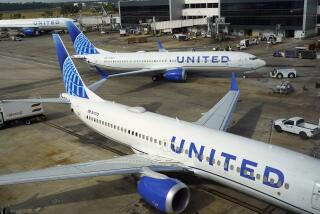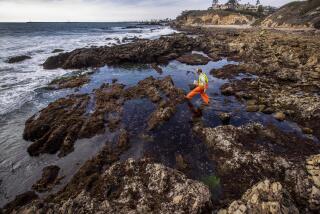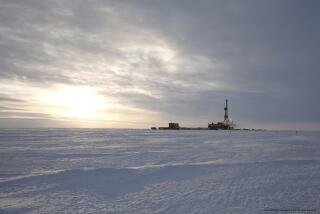Coast Guard finds safety issues with Alaskan Arctic drilling rig
SEATTLE -- A drilling rig that launched landmark exploratory oil operations in the Chukchi Sea Arctic this summer has been cited by the U.S. Coast Guard for serious “discrepancies” in its safety and pollution discharge equipment, the latest in a series of vessel problems that have plagued Royal Dutch Shell’s foray into the Alaskan Arctic.
The Noble Corp., owner of the 47-year-old Discoverer, disclosed Thursday it discovered additional deficiencies in its own inspections, including the possibility of unauthorized collected water discharges outside the allowable period for drilling operations.
Chief Petty Officer Kip Wadlow, spokesman for the Coast Guard in Alaska, said the deficiencies were discovered during a boarding of the drill ship in November as it was moored in Seward, Alaska, at the conclusion of Shell’s brief inaugural drilling season.
“When these inspectors went on board and conducted their inspection, they noticed several major safety and pollution prevention equipment discrepancies on board the vessel that prevented it from meeting federal and international requirements for safety,” Wadlow told the Los Angeles Times.
The Coast Guard ordered the vessel to remain in port until the most serious of the issues were corrected. On Dec. 19, the detention order was rescinded, and the ship was set to sail for Seattle to undergo additional work in dry dock, Wadlow said.
Coast Guard officials said they could not discuss the deficiencies in detail, but said they included problems with crew safety protections and also in equipment for preventing pollution.
“They were serious enough that a port state control detention was issued,” Wadlow said. “Basically, they weren’t allowed to leave port until they were able to bring the ship into compliance with U.S. and international regulations.”
Noble officials said in a news release the problems included issues with the ship’s propulsion and safety management systems. They said their own internal review discovered other potential “non-compliance issues,” including “possible unauthorized collected water discharges outside the period of drilling operations.”
Federal regulations allow Shell to operate in the Chukchi Sea from July to September to avoid potential problems with sea ice.
Shell Alaska spokesman Curtis Smith said one of the issues involves possible damage to a propeller or shaft in transit from the Chukchi Sea to Dutch Harbor, in Alaska’s Aleutian Islands, at the conclusion of this year’s drilling operations, though that damage wasn’t noticed during an inspection at Dutch Harbor.
“Propeller vibration developed during the Noble Discoverer’s journey from Dutch Harbor to Seward, and a tug towed the vessel into port as a precaution, and to prevent possible damage,” Smith said in an email.
Noble officials said they have already corrected some of the issues and plan to resolve the remainder during the previously planned shipyard stay.
“This is a matter we take very seriously, and we’re working diligently with the Coast Guard to correct the issues they’ve identified,” company spokesman John Breed said in an interview.
He said the possible unauthorized water discharges were not connected with any drilling operations. “Ships of all types collect water on board, and we’re trying to investigate whether there was a potential for discharge, but it was not related to drilling. This was not a spill,” he said.
Curtis said Shell Alaska is supporting Noble in rectifying the issues found by the Coast Guard.
“While we take these findings seriously, it is important to note they are largely associated with the vessel’s marine systems and not related to this year’s drilling activities,” he said. “Shell and Noble completed a safe 2012 Alaska exploration season.”
The investigation is only the latest involving the Discoverer, a Liberian-flagged, ice-reinforced vessel originally built as a log carrier and converted in 1975 as a self-propelled drill ship.
The vessel was detained in New Zealand in May 2011 for 10 inspection deficiencies, including failure to show evidence of minimum safe staffing, inoperable navigation lights, compass errors, overdue lifeboat drills, and various certifications that were expired.
In July, the Discoverer drifted from its moorings near Dutch Harbor, nearly running aground. And in November, Shell officials said there was a small flash fire aboard the vessel, at port in Dutch Harbor on its way back from drilling operations, which was identified as an engine backfire in the rig stack. It was quickly extinguished.
Coast Guard records, reviewed by The Times, show the agency investigated three other “incidents” involving the Discoverer at Dutch Harbor, one in July and two in September. All three involved an “alleged pollution source,” including an apparent discharge of oil Sept. 24. The vessel was given a warning, according to the records.
Smith said many of the current problems already have been rectified.
“Of the 16 items noted, six have been closed and 10 will be completed … in the off-season,” he said. “Many of these items were already planned for the Discoverer’s postseason maintenance schedule. As you would expect, the Noble Discoverer will not deploy to Alaska next season until all of the issues have been corrected.”
ALSO:
Storm moves through Northeast, dumping snow, rain
Illegally obtained assault rifles key in recent public shootings
N.Y. news site stirs outrage after publishing gun owners’ names
More to Read
Sign up for Essential California
The most important California stories and recommendations in your inbox every morning.
You may occasionally receive promotional content from the Los Angeles Times.










